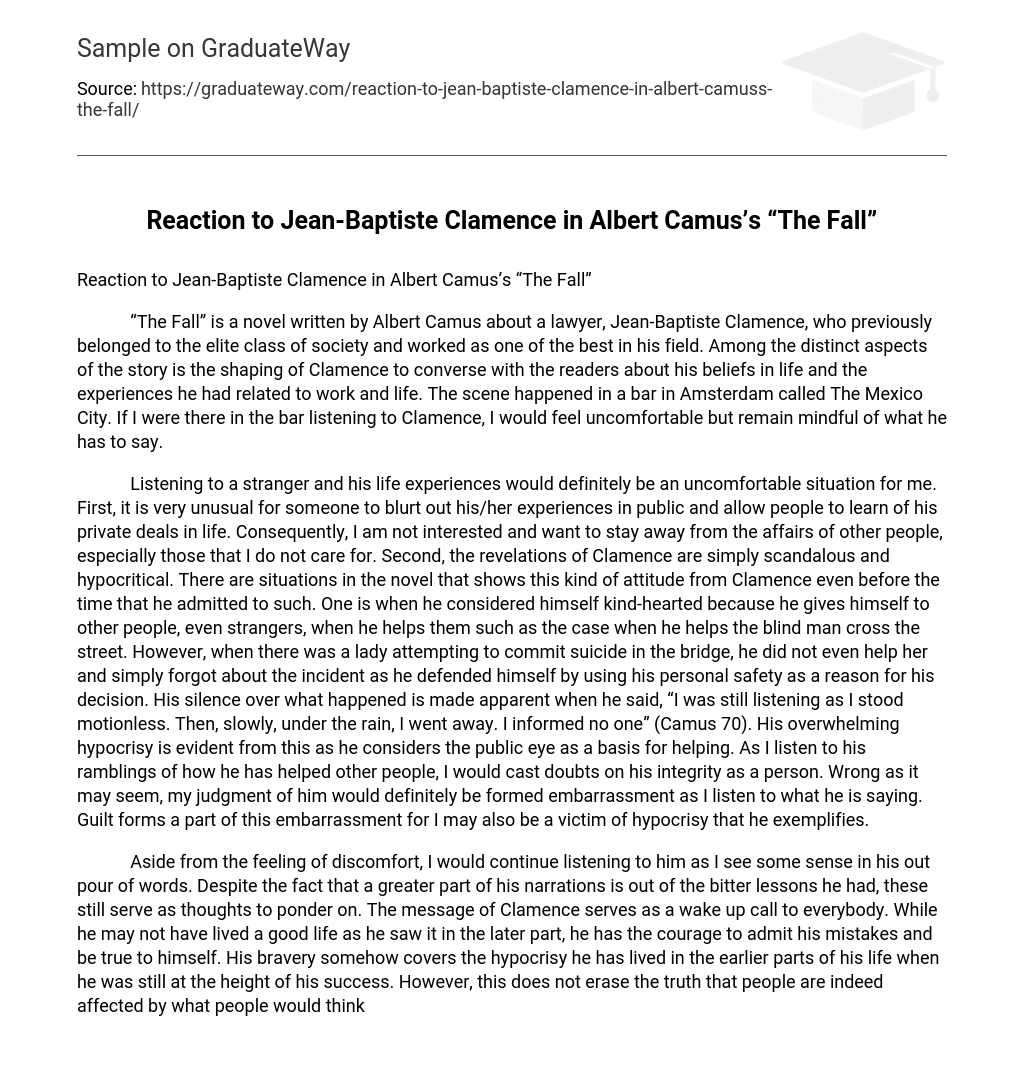“The Fall” is a novel written by Albert Camus about a lawyer, Jean-Baptiste Clamence, who previously belonged to the elite class of society and worked as one of the best in his field. Among the distinct aspects of the story is the shaping of Clamence to converse with the readers about his beliefs in life and the experiences he had related to work and life. The scene happened in a bar in Amsterdam called The Mexico City. If I were there in the bar listening to Clamence, I would feel uncomfortable but remain mindful of what he has to say.
Listening to a stranger and his life experiences would definitely be an uncomfortable situation for me. First, it is very unusual for someone to blurt out his/her experiences in public and allow people to learn of his private deals in life. Consequently, I am not interested and want to stay away from the affairs of other people, especially those that I do not care for. Second, the revelations of Clamence are simply scandalous and hypocritical. There are situations in the novel that shows this kind of attitude from Clamence even before the time that he admitted to such. One is when he considered himself kind-hearted because he gives himself to other people, even strangers, when he helps them such as the case when he helps the blind man cross the street. However, when there was a lady attempting to commit suicide in the bridge, he did not even help her and simply forgot about the incident as he defended himself by using his personal safety as a reason for his decision. His silence over what happened is made apparent when he said, “I was still listening as I stood motionless. Then, slowly, under the rain, I went away. I informed no one” (Camus 70). His overwhelming hypocrisy is evident from this as he considers the public eye as a basis for helping. As I listen to his ramblings of how he has helped other people, I would cast doubts on his integrity as a person. Wrong as it may seem, my judgment of him would definitely be formed embarrassment as I listen to what he is saying. Guilt forms a part of this embarrassment for I may also be a victim of hypocrisy that he exemplifies.
Aside from the feeling of discomfort, I would continue listening to him as I see some sense in his out pour of words. Despite the fact that a greater part of his narrations is out of the bitter lessons he had, these still serve as thoughts to ponder on. The message of Clamence serves as a wake up call to everybody. While he may not have lived a good life as he saw it in the later part, he has the courage to admit his mistakes and be true to himself. His bravery somehow covers the hypocrisy he has lived in the earlier parts of his life when he was still at the height of his success. However, this does not erase the truth that people are indeed affected by what people would think of them and tend to be hypocrites to varying degrees. It just so happened that Clamence’s was very obvious that he even had the will to gratify himself after doing a deed and assume that the public is thankful for everything he does. To a certain extent, this may not solely be the fault of Clamence but a result of an interlocking social factors that shapes people to become hypocrites at one point of their lives.
Nonetheless, I would not engage in a conversation with Clamence but would rather be a conscientious listener. There is still a confusion regarding the purpose of his act. It may be for people to learn from his mistakes in the past and to wake them up about the realities of life or it may be intended for his own search of people like him. For me, it is better to simply just listen and learn from his mistakes rather than to expound on the events of his life as it seems that it is a monologue of his experiences.
Work Cited
Camus, Albert. The Fall. London: Penguin Books, Ltd., 1984





